|
|
|
Sort Order |
|
|
|
Items / Page
|
|
|
|
|
|
|
| Srl | Item |
| 1 |
ID:
166809
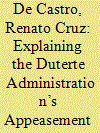

|
|
|
|
|
| Summary/Abstract |
This article examines the reason behind the dramatic shift in Philippine foreign policy under the Duterte Administration. His predecessor, president Benigno Aquino, vigorously challenged China’s expansive territorial claim in the South China Sea throughout his six-year term. However, president Rodrigo Duterte’s actions and pronouncements are undoing the former president’s geopolitical agenda of balancing China’s expansion in the disputed waters. He distances the Philippines from the United States, its long-standing treaty ally, and gravitates toward China. This stance aims to earn goodwill with China so that the Philippines can avail itself of enormous aids and loans from China’s Belt and Road Initiative (BRI). This stemmed from this administration’s fear that the Philippines would not benefit from China’s emergence as an economic power. Nevertheless, by appeasing an expansionist power, the Philippines becomes complicit to China’s long-term strategy of maritime expansion to push the United States out of East Asia. In conclusion, the article warns that the Duterte Administration might end up losing the country’s exclusive economic zone (EEZ) in the South China Sea and the confidence and trust of its allies and security partners. This administration might also leave the public coffers empty and dry because of China’s reneging on its commitment to fund the Philippines’ massive infrastructure-building program, labeled “Build, Build, and Build.”
|
|
|
|
|
|
|
|
|
|
|
|
|
|
|
|
| 2 |
ID:
177487


|
|
|
|
|
| Summary/Abstract |
The housing wealth effect often manifests as a positive relationship between consumption and perceived housing wealth (e.g. the perceived value of houses). When the perceived value of a property rises, homeowners may feel more comfortable and secure about their wealth, causing them to spend more. This study adopts a behavioural approach to verify if this relationship holds true for residential energy consumption in the UK. While controlling for property characteristics and a large number of demographic, socioeconomic and energy-use behaviour variables, we identified a significant relationship between housing wealth and energy consumption. Our models also considered psychological biases in energy consumption behaviours, such as the framing effect. Our findings shed light on the behavioural aspects of housing wealth effect on residential energy consumption and demonstrate the potential to ‘nudge’ households towards energy conservation. Most importantly, we provide empirical evidence on the intriguing relationship among housing wealth, residential energy consumption and fuel poverty. The findings of this study are particularly helpful in designing and implementing energy consumption policies that can strike a balance between social justice and economic efficiency.
|
|
|
|
|
|
|
|
|
|
|
|
|
|
|
|
| 3 |
ID:
091431
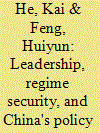

|
|
|
|
|
| Publication |
2009.
|
| Summary/Abstract |
Traditional analyses of Taiwan crises have relied mainly on deterrence theory for their explanatory power. This approach fails to account for China's risk-taking behavior, which can be explained by prospect theory. We suggest that Chinese leaders are more likely to use more risky military coercion against Taiwan's pro-independence movements within a domain of losses, i.e., when their regime faces serious domestic and international challenges to its security. Conversely, Chinese leaders are more likely to employ less risky political pressure to oppose Taiwan's pro-independence forces if their decision making takes place in a domain of gains, i.e., when the security of China's regime is not challenged. We conclude that maintaining a good US-China relationship is the best strategy for the United States to help prevent military crises in the Taiwan Strait.
|
|
|
|
|
|
|
|
|
|
|
|
|
|
|
|
| 4 |
ID:
147342
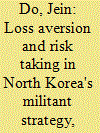

|
|
|
|
|
| Summary/Abstract |
Studies of North Korean foreign policy are increasingly turning to the thesis advanced by prospect theory of loss aversion and reference dependence to explain its risk taking. Most of these studies focus on the post-1990s as the genesis of North Korea's risk-prone behavior. I show that Pyongyang has operated from a frame of losses since the late 1960s, due to the parallel decline of ideological unity in Soviet–North Korean and Sino–North Korean relations. In particular, from 1967 to 1968, North Korea perceived both allies to be more focused on countering each other than on jointly opposing the United States. Consequently, Pyongyang for the first time saw both Moscow and Beijing as doubtful assets in its bid for hegemonic unification. North Korea therefore stressed the role of small countries in the revolutionary struggle and launched the most violent phase of its militant strategy, emphasizing the US threat as the common enemy. The strategy was therefore in part a function of fear rather than a desire for expansion.
|
|
|
|
|
|
|
|
|
|
|
|
|
|
|
|
| 5 |
ID:
171200


|
|
|
|
|
| Summary/Abstract |
Since Korea's transition to democracy in 1987, Korean leaders have become increasingly confrontational toward Japan, with such steps ranging from verbal threats filled with hawkish rhetoric to material threats, such as displays of military force and threats of actually using it. To explain South Korean leaders’ hawkish approach to Japan, we build a theory of “prospective diversion” by combining insights from the diversionary theory of international conflict and prospect theory. We argue that foreign policy leaders have a strong tendency to overvalue political losses relative to comparable gains in their approval ratings. As a result, they are inclined to take risk-seeking diplomatic actions toward foreign adversary to avoid further losses. By conducting statistical analyses and developing case studies of Korean leaders’ confrontational policy decisions regarding Japan, we present empirical findings consistent with our hypothesis that Korean leaders are inclined to engage in prospective diversion toward Japan when they suffer domestic losses. This article provides an enhanced understanding of the domestic political foundation of South Korean leaders’ increasingly contentious attitude toward Japan.
|
|
|
|
|
|
|
|
|
|
|
|
|
|
|
|
| 6 |
ID:
092053


|
|
|
|
|
| Publication |
2009.
|
| Summary/Abstract |
One of the most important psychological barriers to conflict resolution is the rigid structure of the sociopsychological repertoire that evolves in societies immersed in intractable conflict. This article examines ways to overcome the rigidity of this repertoire in the context of the Israeli-Palestinian conflict. Specifically, in line with the prospect theory, the authors assumed that elicitation of beliefs about losses stemming from the continuing conflict may bring about a process of "unfreezing." To test this assumption, an exploratory study with a national sample of the Israeli-Jewish population and two subsequent experimental studies were conducted. The results demonstrated that exposure to information about losses inherent in continuing the conflict induces higher willingness to acquire new information about possible solutions to the conflict, higher willingness to reevaluate current positions about it, and more support for compromises than the exposure to neutral information or to information about possible gains derived from the peace agreement.
|
|
|
|
|
|
|
|
|
|
|
|
|
|
|
|
| 7 |
ID:
171405
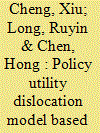

|
|
|
|
|
| Summary/Abstract |
A low-carbon lifestyle is an inevitable choice for mitigating climate change. However, in the actual situation where policy makers and policy target groups are separated from each other, low-carbon lifestyle changes are often manifested as individual strong government actions, behind which social actions are seriously lagging. Based on this observation, in this study a concept of policy utility dislocation was developed, and a policy utility dislocation model was constructed based on prospect theory. Numerical simulation showed that policy utility dislocation can be reduced by increasing the proportion of residents’ environmental benefits, government efforts and subsidies, and reducing the cost of implementing a low-carbon lifestyle for residents. In particular, when the environmental benefits of the government and residents accounted for 15% and 65%, respectively, or the subsidy coefficient was 2, the policy utility dislocation became zero. In addition, policy utility dislocation began to appear when the cost of implementing a low carbon lifestyle exceeded 3. This study enriches the connotation of policy utility and quantifies the policy utility dislocation, and provides new ways to launch policies that promote low-carbon lifestyles.
|
|
|
|
|
|
|
|
|
|
|
|
|
|
|
|
| 8 |
ID:
120124


|
|
|
|
|
| Publication |
2013.
|
| Summary/Abstract |
The premise of the cultural congruence hypothesis is that the level of congruence between democratic values among the public and in political institutions of a country is an important indication of political stability: the greater the congruence, the greater the stability. Though this hypothesis was proposed almost fifty years ago, it has never been fully examined. A crucial weakness of the hypothesis is that it is blind to the direction of incongruence: instability increases if the public has either more or less freedom relative to their expectations. But based on what we learn from Prospect Theory, one may expect to find different behaviors in these two situations. The empirical analyses that follow confirm this expectation. The article also evaluates the congruence hypothesis in light of the institutional hypothesis. Rather than seeing these hypotheses as competing, the authors claim that it is more productive to focus on the interaction between them, thus improving their understanding of political stability.
|
|
|
|
|
|
|
|
|
|
|
|
|
|
|
|
| 9 |
ID:
186815


|
|
|
|
|
| Summary/Abstract |
Despite extensive scholarly interest in the association between economic inequality and political violence, the micro-level mechanisms through which the former influences the latter are not well understood. Drawing on pioneering theories of political violence, social psychological research on relative deprivation, and prospect theory from behavioral economics, we examine individual-level processes that underpin the relationship between inequality and political violence. We present two arguments: despite being a key explanatory variable in existing research, perceived lower economic status vis-à-vis other individuals (an indicator of relative deprivation) is unlikely to motivate people to participate in violence; by contrast, although virtually unexplored, a projected decrease in one’s own economic status (prospective decremental deprivation) is likely to motivate violence. Multilevel analyses of probability samples from many African countries provide evidence to support these claims. Based on this, we posit that focusing on changes in living conditions, rather than the status quo, is key for understanding political violence.
|
|
|
|
|
|
|
|
|
|
|
|
|
|
|
|
| 10 |
ID:
155828
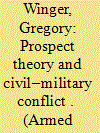

|
|
|
|
|
| Summary/Abstract |
This article investigates the potential use of prospect theory to understand civil–military disputes over the use of force. Specifically, I argue that distinct realms of responsibility can lead civilian and military authorities to inhabit different frames of reference when confronting the same crisis. This divergence in perspective causes each to asses risk in fundamentally disparate ways and ultimately produces competing policy recommendations. To illustrate this theory, I analyze the case of the 1976 Korean tree cutting incident. During this crisis, American military authorities define the situation narrowly as pertaining to the Korean peninsula, whereas the civilian leadership viewed it as part of a global challenge to American resolve. As a result, each party weighed the risks of escalation differently and promoted conflicting policy prescriptions.
|
|
|
|
|
|
|
|
|
|
|
|
|
|
|
|
| 11 |
ID:
076881
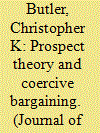

|
|
|
|
|
| Publication |
2007.
|
| Summary/Abstract |
Despite many applications of prospect theory's concepts to explain political and strategic phenomena, formal analyses of strategic problems using prospect theory are rare. Using Fearon's model of bargaining, Tversky and Kahneman's value function, and an existing probability weighting function, I construct a model that demonstrates the differences between expected value and prospect theory when applied to strategic interaction. Critically important to this demonstration is an examination of different types of reference points that make sense for bargaining problems. Four types of reference points are discussed and analyzed: power-based, equity, variants of the status quo, and extreme ``I-want-it-all'' reference points. Each of these types of reference points produce different bargaining behavior at the individual level and in combination with the type of reference point of the other actor. Additionally, I demonstrate that bargaining failure is possible for this model under complete and perfect information using prospect-theoretic logic
|
|
|
|
|
|
|
|
|
|
|
|
|
|
|
|
| 12 |
ID:
160737


|
|
|
|
|
| Summary/Abstract |
How much mileage can we get out of prospect theory to explain foreign policy decision-making? To answer this question, we first argue that risk as outcome uncertainty is the appropriate definition in prospect-theoretical applications. Then, we indicate that probability weighting—a crucial component of prospect theory—is typically ignored in such applications. We argue why this is problematic and suggest how to move forward. Next, we discuss how to establish the reference point in the face of outcomes in multiple dimensions, as is typically the case in foreign policy decision-making. Finally, we discuss what we have learnt regarding prospect theory’s scope conditions and the differences across individuals in the theory’s applicability. Overall, our contribution lies in identifying several underexposed or neglected issues (e.g., the definition of risk and probability weighting), in examining the advancements regarding prospect theory’s scope conditions, and in discussing avenues for further research.
|
|
|
|
|
|
|
|
|
|
|
|
|
|
|
|
| 13 |
ID:
155182


|
|
|
|
|
| Summary/Abstract |
Risk sensitivity combined with prospect theory and framing concepts can be quite useful in explaining which individuals and groups can become radicalised and more likely to resort to terrorism to achieve their political and economic objectives. Such a radicalisation can occur with groups willing to use violence for major gains and for groups seeking to prevent significant losses of status or wealth. The Sikh uprising in the Punjab in the latter part of the twentieth century is an example of terrorism based not on poverty but as part of an effort to preserve or regain a relatively advantageous position. The Sikhs were in a somewhat advantageous situation in India but faced increasing challenges to their economic, political and social position in the Punjab and in India in general. The counterterrorism policies of the government contributed to the perception of threat that further radicalised the Sikh community.
|
|
|
|
|
|
|
|
|
|
|
|
|
|
|
|
| 14 |
ID:
151707


|
|
|
|
|
| Summary/Abstract |
The paper explores terrorist choice by applying two well-known theoretical frameworks: stochastic dominance and prospect theory (PT). We analyse each pair of attack methods that can be formed from the RAND-MIPT database and the Global Terrorism Database. Instances of stochastic dominance are identified. PT orderings are computed. Attention is accorded to the identification of ‘trigger points’ and the circumstances that may lead to an increased likelihood that a terrorist will select an attack method associated with a higher expected number of fatalities, i.e. a potentially more damaging attack method.
|
|
|
|
|
|
|
|
|
|
|
|
|
|
|
|
| 15 |
ID:
072880
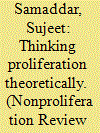

|
|
|
|
|
| Publication |
2005.
|
| Summary/Abstract |
Addressing the challenge of proliferation cannot be successful unless the theoretical underpinnings that rationalize acquisition or renunciation of nuclear weapons are understood. Just as theories explain the phenomenon of conflict and cooperation in international affairs, similarly theories must also explain the phenomenon of nuclear proliferation or restraint. Again, just as sound theory helped policymakers in understanding deterrence politics, a theoretical understanding of the dynamics of proliferation that addresses both the effects of nuclear proliferation and its fundamental causes should benefit nonproliferation policymakers. Long-term idealist goals of a nuclear-weapons-free world need to be theoretically reconciled with realist considerations of the obvious power and prestige that is associated with nuclear weapons. Thinking proliferation theoretically must begin with identifying the stakeholders and spoilers of the contemporary nonproliferation bargain. This article proposes a theory without presenting case studies and reserves policy prescriptions based on these theoretical considerations for a subsequent discussion, keeping in mind Nye's observation that "parsimony suggests that we start with the simple causes, see how much they explain, and go on to more complexity as needed." Some simple causes are stated and the catalysts that spur proliferation reactions are probed in the hopes of provoking "thinking proliferation theoretically."
|
|
|
|
|
|
|
|
|
|
|
|
|
|
|
|
| 16 |
ID:
131264
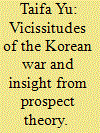

|
|
|
| 17 |
ID:
149495
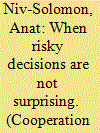

|
|
|
|
|
| Summary/Abstract |
On 12 July 2006, Hezbollah operatives crossed into Israel and attacked a military patrol, killing three soldiers and kidnapping two more. In retaliation to this incident Israel launched a military operation that resulted in 34 days of fighting between Hezbollah and Israel. The Israeli retaliation has been deemed to be severe and surprising. Furthermore, a public investigation commission established by the Israeli government implicated key decision-makers, and especially Prime Minister Olmert, as guilty of hasty and irresponsible decision-making. This article views this case through the lens of prospect theory, showing how the decision was made at the framing stage, and suggesting that this decision was not hasty but, rather, was consistent with the logic of loss-aversion.
|
|
|
|
|
|
|
|
|
|
|
|
|
|
|
|
| 18 |
ID:
113806
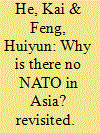

|
|
|
|
|
| Publication |
2012.
|
| Summary/Abstract |
Why did the US prefer multilateral alliances in Europe, but bilateral alliances in Asia after World War II? Rationalists and constructivists debate the impact of power, institutions, and identities in explaining this highly contested question. We introduce a new argument embedded in prospect theory from political psychology - a prospect-threat alliance model - to account for the variation in US alliance strategy toward Europe and Asia after World War II. Through setting the threat level as a reference point for leaders' prospects of gains or losses, we suggest: (1) high threats frame decision-makers in a domain of losses, and multilateral alliances become a favorable alliance choice because states are more likely to take the risk of constraining their freedom of action in return for more help from multiple allies as well as for avoiding further strategic losses; (2) low threats position leaders in a domain of gains, and bilateral alliances win out because states are risk-averse in terms of maintaining their freedom of action in seeking security through alliances with fewer allies. US alliance policy toward Asia after World War II is a within-case analysis that tests the validity of the prospect-threat alliance model.
|
|
|
|
|
|
|
|
|
|
|
|
|
|
|
|
| 19 |
ID:
174727
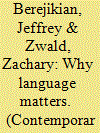

|
|
|
|
|
| Summary/Abstract |
Despite the obvious the risks involved in deterrence bargaining, we know surprisingly little about how the public evaluates risk during a crisis. A limited deterrence scholarship considers domestic preferences and tends to assume that the public’s risk tolerance remains stable throughout a deterrence episode. Yet, robust findings in cognitive psychology suggest that people’s risk tolerance can shift dramatically based on how the potential outcomes of military options are framed. We evaluate these competing views through a series of decision experiments grounded in prospect theory. Across an array of potential extended deterrence scenarios, we demonstrate that simply reframing the language used to describe the possible outcome of military options affects both the public’s willingness to accept risks and, therefore, their willingness to escalate the crisis. These findings condition long-standing concerns about the public’s intransigent risk disposition, which underpin research on costly signaling, deterrence traps, and nuclear self-deterrence.
|
|
|
|
|
|
|
|
|
|
|
|
|
|
|
|
|
|
|
|
|